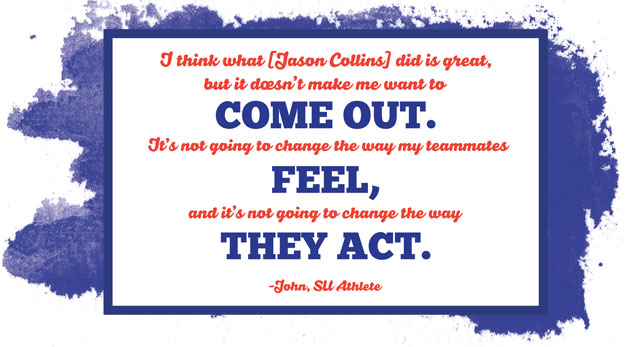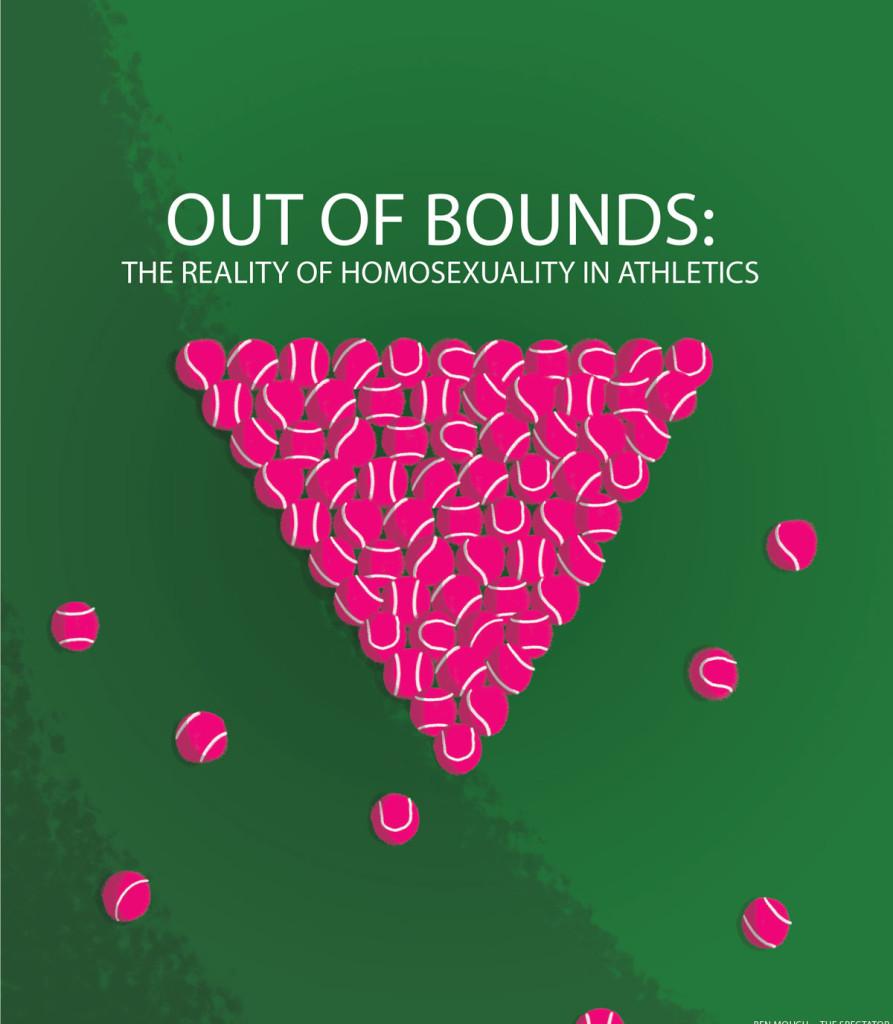While the nation lauds Jason Collins for his courage in being the first openly gay active NBA player, it’s clear that being a homosexual athlete can still be a frightening and isolating prospect for college students.
“John” is an anonymous closeted student-athlete at Seattle University who contacted The Spectator. He plays on a non-co-ed team and says that he isn’t comfortable coming out to his teammates because of what he perceives to be a hostile and homophobic atmosphere. While he’s been aware of his sexuality for years, he’s only ever come out to his family members, and not to teammates. When he first came to Seattle U, John hoped Seattle’s liberal attitude would encourage him to be open about his sexuality, but when he got here he realized how wrong he was. He still heard people use homophobic and racial slurs. His team mates still made jokes about people being “gay” or “faggots.”
Until his interview with The Spectator, John has yet to come out to anyone at Seattle U.
As far as he knows, nobody here knows he’s gay, and they probably never will.
“I won’t come out until after I’ve left Seattle U,” said John. “There are lots of tolerant people in the Athletic Department, but there are some that can be very homophobic. They’re the ones that make me afraid to come out.”
John went on to say that while he’s encouraged by Jason Collins coming out, he’s still afraid to come out to his teammates.
“I think what [Jason Collins] did is great, but it doesn’t make me want to come out,” John said. “It’s not going to change the way my teammates feel, and it’s not going to change the way they act.”
John’s experiences, while deeply saddening, may not be universal.
David Strand, a former member of the cross country team, came out his first night of practice. Strand explained that coming out again in college is a choice. Strand pointed out that the ease that was affiliated with his decision was in large due to the co-ed nature of the team.
“A lot of homophobia in sports does depend on the sport. The cross country team is so co-ed, it’s ridiculous. We are so merged together. Cross country guys are already weird and it’s a hell of a lot easier to come out if there are girls. In different sports with all guys, there’s this hyper-masculine thing going on, it’s a lot different.”

Members of several Seattle U sports teams have voiced their support for openly gay athletes.
Sam Donohue and Nick Connors are freshman on Seattle U’s men’s swimming team. The two share similar opinions with respect to the prospect of a potential homosexual teammate.
“I would be 100 percent supportive because I believe that homosexuality is a natural part of life and is not something that should be discriminated against,” said Donohue.
Connors expanded, saying, “It would not bother me at all. I don’t think being homosexual changes you as a person. You already were homosexual [prior to coming out], so I don’t think that would change how I see you at all.”
Kristen James, a freshman women’s tennis player, agrees.
“I’ve had a really close friend come out and wasn’t affected by it. I can see how other people would treat the situation differently, but in my opinion, they’re still a teammate”
Evidently, there is a clear division between schools of thought amongst Seattle U athletics. Although Seattle U boasts a large and supportive LGBTQ community on the campus, it appears at that some groups on campus, including at least some of the athletic programs, are a little slower to the punch in that arena.
Sociology Professor Jason Capps teaches a sports and sociology course.
“Society everywhere is moving forward [regarding homosexuality legislation],” said Capps. “Sports have been slower though. They are sort of being forced to move forward as well, and on teams, the stereotypes are being broken. Younger people are a lot more comfortable with homosexuality and transgenderism, so maybe that translates to sports.”
Hopefully Capps is right. Hopefully the day will soon come when athletes like John feel comfortable revealing their sexuality.
But for now, being a homosexual athlete can still be a dark and isolating experience.
Emily may be reached at ehedberg@su-spectator.com








